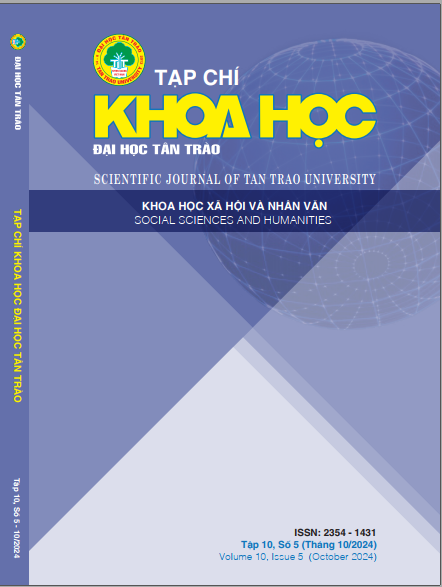VAI TRÒ CỦA ÂM NHẠC TRONG TÍN NGƯỠNG THỜ MẪU TẠI LỄ HỘI RƯỚC MẪU ĐỀN HẠ, ĐỀN THƯỢNG, ĐỀN Ỷ LA, TỈNH TUYÊN QUANG
DOI:
https://doi.org/10.51453/2354-1431/2024/1264Tóm tắt
Âm nhạc đóng một vai trò quan trọng và rất to lớn trong cuộc sống của mỗi con người. Bài viết dựa trên lí luận về âm nhạc, tín ngưỡng, thờ Mẫu, lễ hội,... và thực tiễn lễ rước Mẫu ở đền Hạ, đền Thượng, đền Ỷ La, tỉnh Tuyên Quang để để phân tích, làm rõ vai trò của âm nhạc trong nghi lễ thờ Mẫu trên phương diện: 1/ Tìm hiểu các di tích thờ Mẫu tại đền đền Thượng, đền Hạ, đền Ỷ La Tuyên Quang; 2/ Âm nhạc trong chương trình Lễ hội Đền Hạ, Đền Thượng, Đền Ỷ La. Kết quả nghiên cứu khẳng định: Âm nhạc trong tín ngưỡng thờ Mẫu tại lễ hội rước Mẫu ở đền Hạ, đền Thượng, đền Ỷ La, tỉnh Tuyên Quang không chỉ là phương tiện kết nối con người với thần linh mà còn là yếu tố quan trọng tạo nên bản sắc văn hóa độc đáo.
Tải xuống
Tài liệu tham khảo
Bach, N. (2017). Appreciating Music. Ho Chi Minh City: Ho Chi Minh City General Publishing House.
Basic Materials on Belief in Vietnam. (n.d.). Vietnam Academy of Social Sciences.
Hoa, P. L. (2009). The Melodies of Life. Hanoi: Music Publisher.
Khor, X. (1978). The Educational Role of Music. Leningrad Publishing House.
Linh, L. Y. (2024). Pham Van Kiem and One Hundred Years of Hau Bong – Music – Literature. Hanoi: Writers' Association Publishing House.
Music in Ancient Civilizations. (September 25, 2024). Retrieved from Vietnamese Musicians: (https://hoinhacsi.vn/news/tong-quan-ve-am-nhac-trong-cac-nen-van-minh-co-dai)
Pho, H. T. (2020). Music Researcher Nguyen Quang Long: Music in the Mother Goddess Worship is a Precious Heritage. Retrieved from Great Unity Newspaper:(https://daidoanket.vn/nha-nghien-cuu-am-nhac-nguyen-quang-long-am-nhac-trong-dao-mau-la-di-san-quy-10168201.html)
Quang, T. U.-H.-U. (2024). Geography of Tuyen Quang Province. National Political Publishing House.
Thuan, C. L. (1997). Textbook on Harmony (translated). Ho Chi Minh City: National Music Publishing House.
Tien, T. M. (2009). Cultural Heritage of Dinh So, Tho Vuc Commune, Son Duong District. Em Dat Tuyen Nui Song Diem Le(p. 235). Hanoi: Writers' Association Publishing House.
Tien, T. M. (2012). Mother Goddess Worship in a Forested Land. International Scientific Conference on Vietnamese Mother Goddess Worship* (p. 792). Hanoi: The World Publishing House.
Tien, T. M. (2016). Then Singing and Chau Van Singing in Spiritual Cultural Life. Journal of Literary and Artistic Criticism, 26.
Vietnam National Assembly. (November 18, 2026). Law on Belief and Religion. Retrieved from Legal Library: (https://thuvienphapluat.vn/van-ban/Van-hoa-Xa-hoi/Luat-tin-nguong-ton-giao-2016-322934.aspx)
Tải xuống
Đã Xuất bản
Cách trích dẫn
Số
Chuyên mục
Giấy phép

Tác phẩm này được cấp phép theo Giấy phép Quốc tế Creative Commons Attribution-ShareAlike 4.0 .
Bài báo được xuất bản ở Tạp chí Khoa học Đại học Tân Trào được cấp phép theo giấy phép Ghi công - Chia sẻ tương tự 4.0 Quốc tế (CC BY-SA). Theo đó, các tác giả khác có thể sao chép, chuyển đổi hay phân phối lại các bài báo này với mục đích hợp pháp trên mọi phương tiện, với điều kiện họ trích dẫn tác giả, Tạp chí Khoa học Đại học Tân Trào và đường link đến bản quyền; nêu rõ các thay đổi đã thực hiện và các nghiên cứu đăng lại được tiến hành theo cùng một bản quyền.
Bản quyền bài báo thuộc về các tác giả, không hạn chế số lượng. Tạp chí Khoa học Tân Trào được cấp giấy phép không độc quyền để xuất bản bài báo với tư cách nhà xuất bản nguồn, kèm theo quyền thương mại để in các bài báo cung cấp cho các thư viện và cá nhân.
Mặc dù các điều khoản của giấy phép CC BY-SA không dành cho các tác giả (với tư cách là người giữ bản quyền của bài báo, họ không bị hạn chế về quyền hạn), khi gửi bài tới Tạp chí Khoa học Đại học Tân Trào, tác giả cần đáp ứng quyền của độc giả, và cần cấp quyền cho bên thứ 3 sử dụng bài báo của họ trong phạm vi của giấy phép.






